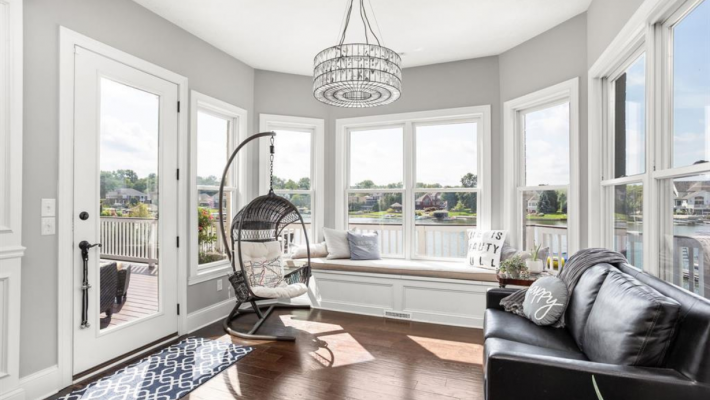Is inflation spiraling out of control along with the cost of food? Is inflation starting to fall again, along with the price of gas at the pumps? Has the recent inflation cycle already peaked?
Honestly, it seems like nobody is 100% sure, and every day brings more news articles and speculation as economists, financial experts and the powers that be try to sort it out.
What should you do in the meantime to best protect yourself against the ebb and flow of an inflation cycle that seems to be largely out of control? You might want to consider buying a house – because a mortgage may be one of the most secure inflation hedges you can get.
What’s Inflation Hedging?
Inflation is basically the term for any situation where the purchasing power of the dollar starts to decrease. As prices rise, the relative value of your currency starts to fall.
Inflation hedging means putting your money into investments that either tend to stay stable over the long run or actually rise in value with inflation. When inflation seems to be spiraling out of control (or doing whatever it is currently doing), a lot of people start moving away from stocks and bonds and begin looking for alternative investments. This is particularly true because stocks and bonds both are very reactive to shifts in the market, making them an increasingly unsure gamble in difficult times.
For a lot of folks, that means considering an investment in real estate – whether they buy a home to live in themselves or just want to put their money into a piece of property they can rent out again.
What Makes Real Estate a Good Inflation Hedge?
It is true that mortgage rates have risen somewhat since the historic lows that consumers were enjoying a year ago, but they still are not prohibitively high. That means this is still an ideal time (despite a market that is still arguably in the sellers’ favor) to purchase real estate.
How does that help protect your money from being devalued due to inflation? Well, the demand for housing isn’t slowing down and never really stops – so your home is going to continue to rise in value as long as you care for it properly and keep it well-maintained. Since your money is invested in your home, that means your money is growing in value as inflation rises, not shrinking.
But, that’s not the only advantage to getting a mortgage and a home right now. Something else that isn’t likely to slow down or decrease is the cost of renting.
If you lock in a relatively low interest rate today at a price you can afford, you’ll be looking at a consistent mortgage payment for the next decade or so. While your friends may constantly have to deal with escalating rents, your housing costs will stay stable over the duration thanks to a fixed-rate mortgage loan. (And, naturally, if you’re buying a home to rent it back out again, you can expect your cash flow to increase over time as rents rise, even though your mortgage payment remains steady.)
How Should Inflation Factor Into Your Home Buying Process?
Another thing that you need to consider is that inflation also causes construction materials to rise, and that leads to two things: A major slow down where new construction is concerned and an increase in the value of existing properties.
As buyers increasingly have to compete with each other for a limited number of available properties at any given moment and home prices continue to drift upward, it’s usually wise to adjust your buying strategy accordingly. Here are a few tips:
1. Understand your budget.
A lot of experts suggest that you should start by figuring out the absolute maximum that you can afford on a mortgage payment each month and then use that figure to determine exactly how much house you can afford. Even a small increase in interest rates may be enough to make you revise your expectations.
Keep in mind, also, that you have to factor in higher costs for just about everything associated with buying a home. Sure, movers may be more expensive – but your real monthly costs can be in your utilities. This is a good time to think about energy efficiency when you’re looking at homes.
2. Expand your search (but cautiously).
It’s also a good time to consider looking at properties that you may not have considered before inflation started rising. Rural areas typically have lower prices than trendy neighborhoods, and you may find a home in an older, relaxed neighborhood at a much better price than one in an upscale development with an HOA.
Keep in mind, however, that you may not want to invest in a “fixer-upper” right now. With housing materials growing ever-so costly and supply chain interruptions, what was once a cheap fix could be very expensive now. Even cosmetic changes to your new home could be pricey.
3. Try to lock in an interest rate quickly.
Get pre-approved (not pre-qualified) with a lender that will offer you accurate information, strengthen your buying power and help you lock in an interest rate that you’re comfortable paying. Tucker Mortgage Loan Officers can be your resource to help determine how much you can afford. The sooner you act, the better you can insulate yourself against ongoing problems with inflation.
So, what’s the main takeaway from all this? Well, if you keep waiting to buy a home, you run the risk that the government will soon step in – more than it already has – to raise interest rates on mortgages and other loans. That will ultimately make home buying much more expensive in the future and you could lose the opportunity you have now to protect yourself against the perils of inflation.
bill.ingram@talktotucker.combrad.layton@talktotucker.comeditors-pickfeaturedlloyd.zimmerman@talktotucker.commark.callahan@talktotucker.commary.layton@talktotucker.compriscila.hale@talktotucker.comterri.mcgraw@talktotucker.com




